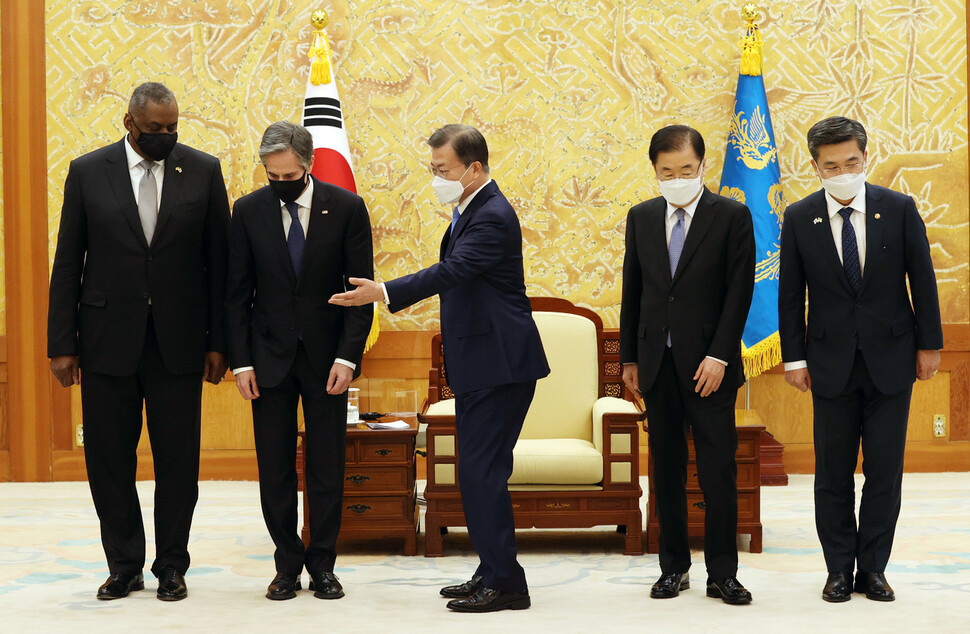
President Moon Jae-in is taking a commemorative photo at the Blue House on the afternoon of the 18th prior to an interview with US Secretary of State Tony Blincoln and Defense Secretary Lloyd Austin. From left: Austin, Minister of Blincoln, President Moon, Minister of Foreign Affairs Jeong Eui-yong, and Secretary of Defense Seo Wook. Blue House Photo Reporters
South Korean and US foreign ministers and defense ministers confirmed on the 18th that “the North Korean nuclear and ballistic missile issue is a priority concern of the alliance” and agreed that it should be dealt with under “a completely coordinated strategy between South Korea and the US”. The two countries praised the solidity of the ROK-US alliance for two days, but their approach toward North Korea and the public revealed certain differences of opinion. President Moon Jae-in met with Secretary of State Tony Blincoln and Defense Minister Lloyd Austin, who prevented the Blue House, and said, “We will do our best to realize the peace process on the Korean peninsula including the complete denuclearization of North Korea.” There is a need to come up with it.” President Moon also said, “We will continue to strive to restore Korea-Japan relations.” Earlier, Foreign Minister Eui-yong Eui and Defense Minister Seo-wook held a meeting of the US-Korea Foreign Affairs and Defense Ministers (2+2) at the Ministry of Foreign Affairs Building in the morning with the two US ministers. This meeting has been 5 years since it was held in Washington, USA in October 2016. In a joint statement containing the results of the meeting, the US and Korea emphasized that the issue of North Korean nuclear and ballistic missiles is a priority concern of the alliance, and reaffirmed their shared will to cope with and resolve this issue. He added, “We have confirmed the importance of the international community, including North Korea, to fully implement the relevant UN Security Council resolutions.” He said, “We agreed that these issues should be dealt with under a fully coordinated North Korea strategy between Korea and the United States.” However, at the conference on the same day following the previous day, however, Minister Blincoln once again poured out a strong remark toward China, and criticized North Korea as “the North Korean people are being subjected to widespread and systematic abuse under the oppressive regime.” The ROK-US did not specifically mention’China’ in the joint statement, but Minister Blincoln said at an interview, “We (Korea-US) are clearly aware that China has consistently broken its promises.” We discussed the difficulties that authoritative actions are creating in the stability, security and prosperity of the Indo-Pacific region.” He then emphasized, “Because of China’s actions, a common approach between our allies has become more important.” Minister Chung appeared on the afternoon of the day, saying, “Both the US and China are important to all of us,” and took a distance from Minister Blincoln’s successive remarks to the public. Regarding the transition of the wartime operational control (OPCON), an important issue between the United States and the United States, Secretary Austin said, “It will take more time to meet the conditions for the transition,” suggesting that early transition is disrupted. Regarding the call for the suspension of joint exercises between Korea and the United States, which is a symbol of the withdrawal of the’hostile policy’, in a joint statement, he said in a joint statement that “we must maintain a joint readiness against all common threats to the alliance through joint exercises and exercises.” It was virtually rejecting the North’s request. Meanwhile, the first vice minister of North Korean Foreign Affairs Choi Sun-hee said, “The United States has attempted to contact New York through various channels since mid-February (with the United Nations Office). “We don’t think we need to give back to America’s time-earning game again.” Secretary Blincoln did not respond much. By Kim Ji-eun, senior reporter Park Byeong-soo and Lee Je-hoon, [email protected]
